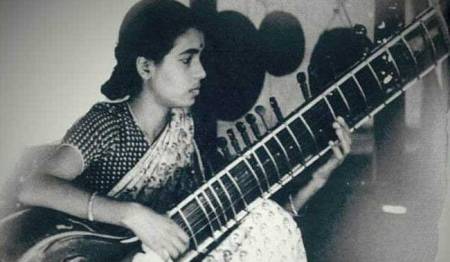On 13th of October 2018 the Hindustani Classical Music family lost her Great-Grand-Mother, the elusive legendary Padma Bhushan Annapurna Devi (91). She is considered to be one of the greatest exponents of Indian music and a master in the traditional string instruments surbahar and sitar. The musical training of Annapurna Devi started from a very young age under her father, Ustad “Baba” Allauddin Khan. He was a sarod player, multi-instrumentalist, composer and one of the most notable music teachers in Hindustani classical music. Annapurna Devi helped her father to establish one of the most prominent gharana’s of the 20th century the (Senai)-Maihar Gharana. The fame and respect that Hindustani classical music receives today -by far in the Western society- originates from this Gharana. The two prominent names that the Western world is familiar with are Pandit Ravi Shankar (sitar) and Pandit Hariprasad Chaurasia (bansuri).

Pandit Ravi Shankar
Ustad “Baba” Allauddin Khan was the teacher of the late Padma Vibhushan and Bharat Ratna Pandit Ravi Shankar (2012). He married the famously reclusive surbahar player Annapurna Devi. Together they had one son, Shubhendra Shankar, who passed away in 1992. Some say that to save her marriage, Annapurna Devi took a vow before an image of her father and Goddess Shardama that she would never perform in public again. But even this sacrifice didn’t save her marriage with Pandit Ravi Shankar. After his Europe and America tour Ravi Shankar divorced Annapurna Devi in the 1960’s and from that moment she also disappeared from the public eye. According to connoisseurs and music critics Annapurna Devi was a much more gifted musician than her (ex) husband Ravi Shankar and that this knowledge made him insecure. Pandit Ravi Shankar was in the peak of his career in the 1960’s and shared the stage with many popular musicians such as violinist Yehudi Menuhin and Beatles guitarist George Harrison. It’s his influence that popularized Indian music and instruments in pop music and without doubt he is the father of Indian fusion music who engaged in Western music by writing compositions for sitar in orchestra’s.

Pandit Ravi Shankar has shared his knowledge about music with many of his great students, but his daughter Anoushka Shankar is by far the most wellknown of his pupils across the globe. One might say that even Anoushka Shankar is the offspring of Maihar Gharana, which was co-founded by Annapurna Devi. In 2017 Anoushka won the Eastern Eye Arts, Culture & Theatre Awards (ACTA) Award for Music for outstanding achievements in the Indian classical and progressive world music scenes.

To have a better understanding of Annapurna Devi’s personal life please read this article.

Pandit Hariprasad Chaurasia
Among Annapurna Devi’s most eminent students is Pandit Hariprasad Chaurasia (bansuri). Chaurasia had a hard time to convince Annapurna Devi to accept him has her student. After many rejections Annapurna Devi tested Chaurasia’s commitment by asking him to forget whatever music he had learned so far and to switch from right-handed to left-handed playing bansuri, Chaurasia accepted this life-changing decision and now decades later the world showers him with much love and respect. For years, Pandit Chaurasia is the artistic director of Codarts Indian World Music department and he is the teacher and inspirator of hundreds of music students across the globe. Pandit Chaurasia established his own renewed music school Vrindaban Gurukul in Mumbai and the other in Bhubaneswar in Odisha. In his Gurukul’s he still keeps the ancient Guru-shishya tradition alive where the students (shishya) and teacher (guru) live together. His students aim to continue the legacy of their guru by teaching and performing on a global level. To name a few students of Pandit Chaurasia; Rakesh Chaurasia, Rupak Kulkarni, Shankar Tucker and Saskia Rao de Haas.

To conclude
Indian classical music needs more supporters in Europe that can carry the legacy of Annapurna Devi and the ideologies that she embodied which is that the legacy of talented musicians should continue. It’s great that when music maestro’s perform concert halls are filled, but we should also consider to give upcoming and talented musicians a platform. The same goes for our audience, who should try to attend concert to hear the history of these important Gharana’s through the voice or instruments of these musicians. The legacy that Annapurna Devi leaves behind can blossom further if representatives of Indian music, be it musicians, organizers, teachers or scholars work together to build a stronger music community. Annapurna Devi’s lifework pinpoints that education is the key for preserving this ancient music tradition. Basically the main idea is to express joy or excitement for music without pressure, and keep building awareness about the importance of Indian music in the Western society.
Mahesvari Autar
Founder DesiYUP
Respected students of Annapurna Devi:
Aashish Khan (Sarod),
Amit Bhattacharya (Sarod),
Bahadur Khan (Sarod),
Basant Kabra (Sarod),
Hariprasad Chaurasia (Bansuri)
Nityanand Haldipur (bansuri)
Nikhil Banerjee (Sitar)

